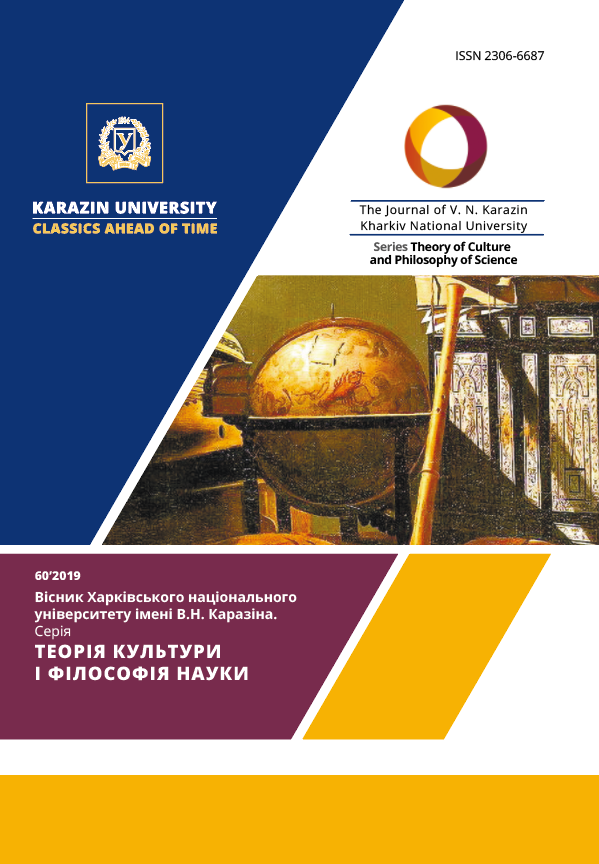Cosmopolitanism in the discursive landscape of modernity: two enlightenment articulations
Abstract
The article is devoted to the analysis of the discourse of cosmopolitanism in various spheres of European self-consciousness and self-expression – in political philosophy, in comparative literary criticism, in aesthetics and in the history of literature. The author argues that the discourse of cosmopolitanism becomes important in the formation of the national state (polis) as a form of «inclusion» or «exclusion» of certain categories of citizens whose corresponding to the ethos of the policy (or no).
Downloads
References
Tihanov G. Cosmopolitanism: Legitimation, Opposition and Domains of Articulation // Language, Ideology, and the Human: New Interventions / Ed. by S. Bahun and D. Radunovic. – Aldershot: Ashgate, 2012.
Benhabib S. The Rights of the Others. – Cambridge: Cambridge University Press, 2004.
Derrida J. Force of Law: The “Mystical Foundation for Authority” // Deconstruction and the Possibility of Justice / Ed. by D. Cornell, M. Rosenfeld, and D. G. Carlson. New York: Routledge, 1992. P. 3 – 67
Beck U. The Cosmopolitan Vision; Held D. Cosmopolitanism: Ideals and Realities. Cambridge: Polity, 2010.
Calhoun C. Social Solidarity as a Problem for Cosmopolitan Democracy // Identities, Affiliations, and Allegiances / Ed. by Seyla Benhabib et al. Cambridge: Cambridge University Press, 2007. P. 285 – 302
Gueye С.М. Late Stoic Cosmopolitanism: Foundations and Relevance. Heidelberg: Winter, 2006.
Kleingeld P. Kant's Theory of Peace // The Cambridge Companion to Kant and Modern Philosophy / Ed. by Paul Guyer. Cambridge: Cambridge University Press, 2006. P. 477 – 504
Mecklenburg N. Kosmopolitismus vs. Regionalismus im deutschen kulturellen Erbe // Gegenwart als kulturelles Erbe. Ein Beitrag der Germanistik zur Kulturwissenschaft deutschsprachiger Lander / Bernd Thum (Hrsg.). Munchen: Iudicium, 1985. S. 317 – 333
Rebmann G.F. Kosmopolitische Reisen durch einen Teil Deutschlands / H. Voegt (Hrsg.). Frankfurt am Main: Insel, 1968. – S. 56
Feldmann W. Modeworter des 18. Jahrhunderts II', Zeitschrift fur deutsche Wortforschung 6. 3 – 4 (1904/1905). – S. 299 – 353
Eze E. The Color of Reason: The Idea of “Race” in Kant's Anthropology // Anthropology and the German Enlightenment: Perspectives on Humanity / Ed. by Katherine M. Faull. Lewisburg, PA: Bucknell University Press, 1995. – P. 200 – 241
May J.A. Kant's Concept of Geography and Its Relation to Recent Geographical Thought. Toronto: University of Toronto Press, 1970. – P. 4.
Ripstein A. Force and Freedom: Kant's Legal and Political Philosophy. Cambridge, MA: Harvard University Press, 2009. – P. 296.
Derrida J. On Cosmopolitanism and Forgiveness. – London; New York: Routledge, 2001.
Schott R.M. Feminism and Kant: Antipathy or Sympathy? // Autonomy and Community: Readings in Contemporary Kantian Social Philosophy / Ed. by Jane Kneller and Sidney Axinn. Albany: State University of New York Press, 1998. P. 87 – 100
Schmitt C. Die Raumrevolution. Durch den totalen Krieg zu einem totalen Frieden // Idem. Staat, GroBraum, Nomos. Arbeiten aus den Jahren 1916 – 1969 / G. Maschke (Hrsg.). Berlin: Duncker & Humblot, 1995. S. 388 – 394 .
Schmitt C. Die geschichtliche Struktur des heutigen Welt-Gegensatzes von Ost und West. Bemerkungen zu Ernst Jungers Schrift: “Der Gordische Knoten” // Freundschaftliche Begegnungen. Festschrift fur Ernst Junger zum 60. Geburtstag / Armin Mohler (Hrsg.). Frankfurt am Main: Klostermann, 1955. – S. 133 – 167.
Schmitt C. Die Ordnung der Welt nach dem zweiten Weltkrieg // Idem. Staat, GroBraum, Nomos. S. 592 – 618.
Кант И. Идея всеобщей истории во всемирно-гражданском плане // Кант И. Сочинения: В 6 т. Т. 6. С. 21.
Цит. по: Schamoni W. “Weltliteratur” – zuerst 1773 bei August Ludwig Schlozer // Arcadia. 2008. Vol. 43. № 2. P. 288 – 298
Damrosch D. What is World Literature? Princeton, N.J.: Princeton University Press, 2003; PizerJ. The Idea of World Literature. Baton Rouge: Louisiana State University Press, 2006
Weitz H.-J. “Weltliteratur” zuerst bei Wieland // Arcadia. 1987. Vol. 22. № 2. P. 206 – 208.
Hazard P. Cosmopolite // Melanges d'histoire litteraire generale et comparee offerts a Fernand Baldensperger: 2 vols. Paris: Honore Champion, 1930. Vol. I. P. 354 – 364
Див.: Костырченко Г. В плену у красного фараона. – М.: Международные отношения, 1994. Гл. 4. Див. також: Костырченко Г. Сталин против “космополитов”. Власть и еврейская интеллигенция в СССР. – М.: РОССПЭН, 2009
Див.: Асмус В. Фашистская фальсификация немецкой классической философии. – М.: ОГИЗ; Госполитиздат, 1942. – С. 6, 18.
Див.: Костырченко Г.В. Тайная политика Сталина. Власть и антисемитизм. М.: Международные отношения, 2001. – С. 314, С. 319
Батырина Г.С., Девятко И.Ф. Еврейский вопрос: хроника сороковых годов // Вестник РАН. 1993. Т. 63. № 1. – C. 69
Див.: Азадовский К., Егоров Б. Космополиты // НЛО. 1990. № 36. С. 83 – 135; Azadovskii K., Egorov B. From Anti-Westernism to Anti-Semitism // Journal of Cold War Studies. 2002. Vol. 4. № 1. P. 66 – 80; Алымов С. Космополитизм, марризм и прочие “грехи”: отечественные этнографы и археологи на рубеже 1940 – 1950-х годов // НЛО. 2009. № 97.
Нусинов И. Пушкин и мировая литература. М.: Советский писатель, 1941.
Див.: Tihanov G. Cosmopolitans without a Polis: Towards a Hermeneutics of the East – East Exilic Experience (1929 – 1945) // The Exile and Return of Writers from East-Central Europe / Ed. by J. Neubauer and Z. Torok. Berlin; New York: Walter de Gruyter, 2009. – P. 123 – 143.
За плідні дискусії я хочу подякувати колегам з Інституту вивчення космополітичної культури (RICC) Манчестерського університету, особливо Ніну Глік-Шиллер, Джекі Стейсі і Джиан Пракаш. Матеріал, використаний в цій статті, був представлений на лекціях і семінарах в Тюбінгені, Сен-Галлені, Берліні, Відні, Ессексі, Абердіні, Прінстоні, Москві та Софії. Мої подяки Шамм Шачадат, Доротеї Кіммі, Ульріху Шміду, Хенріку Шмід, Георгу Вітте, Тімоті Снайдеру, Кшиштофу Міхальські, Івану Крастеву, Сані Бахуні-Радуновіч, Девіду Даффу, Джиан Пракаш, Сергію Зенкину, Діані Мішковоі та їх колегам за гостинність і добрі бесіди.




